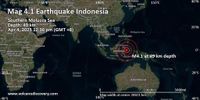On Friday, April 4, 2025, a moderate earthquake measuring 4.1 on the Richter scale struck the Southern Molucca Sea in Indonesia at 12:36 PM local time (GMT +8). This seismic event adds to a series of tremors that have recently affected various regions in the Middle East and Southeast Asia.
The Indonesian earthquake, while significant, did not lead to any immediate reports of damage or injuries. Local authorities are closely monitoring the situation, ensuring that residents are informed and prepared for any aftershocks that may occur. The region is known for its seismic activity, being situated on the Pacific Ring of Fire, which makes it prone to earthquakes.
Just a few days earlier, on March 31, 2025, a separate earthquake of 4.0 magnitude hit the border area between Saudi Arabia and Qatar. This quake struck at 11:42 PM Mecca time, with a depth of 10 kilometers beneath the Earth's surface. Residents in nearby areas felt the tremor, leading to a wave of concern among the local populations. Fortunately, there were no reports of significant damage or injuries following this earthquake as well.
In response to the Saudi quake, local authorities in both Saudi Arabia and Qatar issued statements reassuring citizens that they were closely monitoring the seismic activity. They emphasized their readiness to address any potential developments. "We are prepared to handle any seismic events that may occur in the coming hours," local officials stated, highlighting the importance of vigilance and preparedness in such situations.
Residents in both regions are advised to stay in safe locations, particularly away from windows and heavy objects that could pose a risk during aftershocks. Authorities have also recommended that citizens keep abreast of news updates and follow any instructions issued by local emergency services.
The recent earthquakes underscore the ongoing seismic risks faced by countries situated along tectonic plate boundaries. As communities in Indonesia and the Middle East grapple with the effects of these natural events, the importance of preparedness and timely communication from authorities becomes increasingly evident.
In Indonesia, the government has not only focused on immediate response but also on long-term strategies to improve earthquake preparedness. Educational programs are being implemented to inform residents about safety measures during an earthquake, including evacuation routes and emergency kits.
Similarly, in Saudi Arabia and Qatar, officials are working on enhancing infrastructure resilience against earthquakes. This includes retrofitting buildings to withstand seismic forces and conducting regular drills to ensure that citizens know how to react during an earthquake.
Despite the lack of immediate damage reports from the recent earthquakes, the psychological impact on residents can be significant. Many people experience anxiety and fear after such events, which can lead to a heightened sense of vulnerability. Authorities are encouraging communities to engage in supportive discussions and share resources to help alleviate these concerns.
As the world continues to face the challenges posed by natural disasters, the importance of international cooperation in disaster preparedness and response becomes increasingly clear. Countries like Indonesia, Saudi Arabia, and Qatar can benefit from sharing knowledge and strategies for mitigating the impacts of seismic events.
In conclusion, while the recent earthquakes in both Indonesia and the Saudi-Qatar border area have not resulted in significant damage, they serve as a reminder of the ongoing risks posed by natural disasters. Authorities in both regions are taking proactive steps to ensure the safety and preparedness of their citizens, emphasizing the need for continued vigilance in the face of potential aftershocks.





